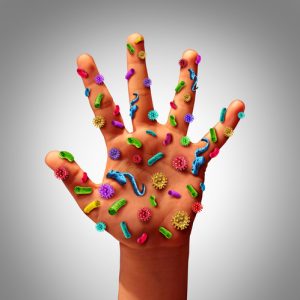
In this blog, we explore the most common harmful chemicals found in cleaning products and provide tips for safer cleaning practices. The best way to keep yourself and your home and family safe is to learn and educate yourself on the toxicity of chemicals. Avoid using these cleaning chemicals and replace them with safer solutions and practices to safeguard your home and family.
Here are ten of the most common harmful chemicals found in household cleaners that are often found on supermarket shelves and their potential health impacts.
Found in: Glass cleaners, bathroom cleaners and polishing agents.
Health Risks: Can irritate the skin, eyes, throat, and lungs. Prolonged exposure can lead to chronic respiratory issues and is particularly dangerous for individuals with asthma.
Found in: Disinfectants, toilet bowl cleaners and mould removers.
Health Risks: Can cause skin burns, eye damage and respiratory irritation. Mixing bleach with ammonia or acidic cleaners can produce toxic chloramine or chlorine gas, which can be fatal.
Found in: Scented products like air fresheners, dish soaps, and even toilet paper.
Health Risks: Linked to hormone disruption, reproductive issues, and developmental problems in children. Exposure is often through inhalation or skin contact.
Found in: Antibacterial soaps, detergents and hand sanitizers.
Health Risks: Can contribute to antibiotic resistance and is a suspected endocrine disruptor. It may also affect thyroid function and contribute to liver toxicity.
Found in: Disinfectant sprays, wipes and fabric softeners.
Health Risks: It can cause skin irritation, respiratory issues, and has been linked to asthma development. Overuse can contribute to the development of antibiotic-resistant bacteria.
Found in: Window cleaners, kitchen cleaners and multipurpose cleaners.
Health Risks: Can cause sore throat, narcosis, pulmonary oedema and severe liver and kidney damage with prolonged exposure.
Found in: Some air fresheners, disinfectants and furniture polishes.
Health Risks: This is a known carcinogen that can cause respiratory problems, skin irritation, and has been linked to cancer with long-term exposure.
Found in: Bleach, mildew removers and toilet bowl cleaners.
Health Risks: It can cause skin and eye irritation, respiratory issues, and when mixed with other chemicals like ammonia, it releases toxic gases that can cause severe respiratory damage or death.
Found in: Oven cleaners, drain openers and industrial cleaners.
Health Risks: Highly corrosive and can cause severe burns to skin and eyes, respiratory issues if inhaled, and damage to the gastrointestinal tract if ingested.
Found in: Dry-cleaning solutions, spot removers and carpet cleaners.
Health Risks: Classified as a probable human carcinogen. Long-term exposure can affect the central nervous system, liver and kidneys.
Cleaning your home is essential for maintaining a healthy and comfortable living environment. By making informed choices and adopting healthier cleaning habits, you can protect yourself and your loved ones while keeping your home spotless.
Always read product labels and be aware of the ingredients, especially if you are purchasing cleaning chemicals from supermarket shelves. The manufacturer won’t always have your best interest at heart.
Consider using natural cleaning products like vinegar, baking soda, lemon juice and essential oils in your home. Bliss Home Care Services only uses GECA certified and approved green cleaning products. These products are also available for purchase, click here for more information.
Ensure good ventilation when using cleaning products to minimise inhalation of fumes. Opening windows and doors for 10 minutes each day also keeps your home fresh, eliminates bacteria and improves indoor air quality.
Always wear gloves when cleaning, and if necessary wear a mask to protect your skin and respiratory tract and glasses to protect your eyes. Prevention is always better than dealing with the after-effects of chemical burns or skin irritation. Ensure any cleaning products and chemicals are stored in a safe place, away from young children and pets.
Avoid mixing cleaning chemicals at all times, especially bleach and ammonia, to prevent the release of toxic gases. Seek medical attention if you feel unwell or dizzy if you have been around chemical cleaning products.
You may also like to read our article, Benefits of Green Cleaning for Your Health and Home and why it’s an essential practice for today's conscientious individual.
The origins of Bliss Home Care go back well before we moved into the house cleaning industry. It was during our careers in community service and health services that we understood the pleasure we get from nurturing and the importance of the ‘small stuff’ to improving people’s lives.
A clean house nurtures the soul. It creates an air of freedom. And of course it provides free time to spend with family and friends or doing activities we love. We have always chosen green cleaning products that are locally made and independently approved and certified by GECA (Good Environmental Choice Australia). Read more about our brand story here.